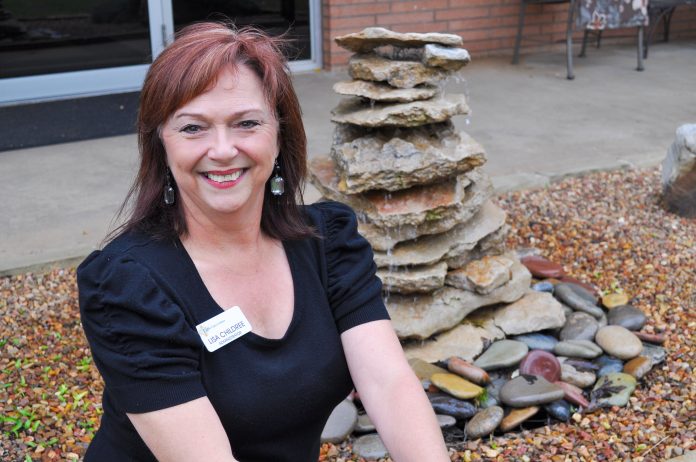
by Bobby Anderson, Staff Writer
Heisman Trophy winner Jason White and the Braum Family farm are arguably Tuttle’s two biggest claims to fame.
But this city in Grady County with a population of barely 6,000 is a test site for a new care model that promises to revolutionize elder care.
Tuttle Care Center is one of four nursing homes in the state involved in a 12-week evidence-based fall prevention study organized by the Fran and Earl Ziegler OU College of Nursing.
The study, entitled It’s Not OK to Fall, is led by Diana L. Studevant, PhD, GCNS-BC, APRN and Teri Round, BSN, MS, RN, BC-NE.
“We were tickled about all the things that would help the elderly not fall,” Childree said.
It has been estimated that one in three women and one in 12 men will sustain a hip fracture in their lifetime.
It has been reported that 86% of hip fractures occur in individuals aged 65 years and older.
More than 25,000 deaths in older adults were attributed to unintentional fall injuries in 2013.
Childree said much research has been done in the state of Wisconsin on preventing falls.
Wisconsin has one of the highest rates of death from unintentional falls in the nation. In fact, the death rate due to unintentional falls in Wisconsin is twice the national average.
That’s when the state decided to do something.
The Four P’s
Childree said the program includes following the Four P’s which includes position, personal needs, pain and placement.
Proper positioning of the resident reduces the need for them to try to reposition themselves on their own.
Meeting personal needs refers to asking whether the resident needs to toilet. Again, having someone there to help the resident meet a need helps reduce the potential for the resident to get themselves in a compromising position that may cause a fall.
Keeping a resident’s pain under control also allows them to rest comfortably.
And, finally, placement of a resident’s call light, reading glasses, walker, tissues and other necessary items is important to prevent residents from having to have to hunt them down.
There is a school of thought that still thinks falls are inevitable.
“I disagree,” Childree said. “The philosophy of this group is ‘what are we doing to cause them to fall.’”
That’s why Childree’s team has adopted a CSI-type approach when investigating falls. Asking questions of the resident involved in a fall is a good first step but also trying to gain as much information as possible including several photos of the area where the fall happens helps.
“We cause them to fall for some reason,” Childree said. “We want them to take a picture of the surroundings before anything is moved that way we can look at it just like an investigator does at a crime scene.”
Childree has a fall team that meets regularly to review all incident reports and decide what actions can be taken.
Childree said sleep is also a major component in falls risk. The traditional method of checking a resident every two hours to see if they are dry might be doing more harm than good.
“They’re not getting into that deep REM sleep so they did a study and that’s like torture,” Childree said. “That’s why you see a lot of nursing home residents that sleep during the day.”
Tuttle Care residents are also taking part in Tai Chi.
Scientific studies show that the practice of Tai Chi improves, and prevents, almost all chronic conditions including arthritis, heart disease and diabetes. In addition, it improves balance, immunity, and reduces stress. In fact, Tai Chi improves practically every aspect of health.
Kelli Brummer teaches Tai Chi at the Care Center weekly and works for the Oklahoma Healthy Aging Initiative, a statewide program through the Department of Geriatric Medicine at the OU Health Sciences Center. In addition to Tuttle she works with residents at Spanish Cover in Yukon and Cedar Creek in Norman.
“It’s been good,” Brummer said. “We’re having a great time at Spanish Cove. They do Tai Chi in the independent part anyway and we’ve had residents come over. It’s fun.”













